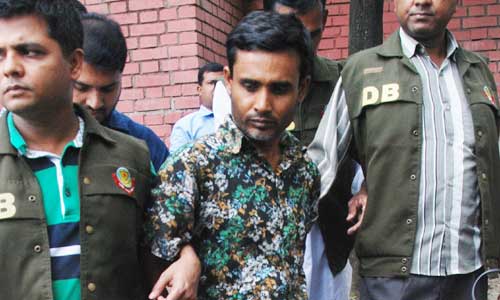The police’s counter-terrorism and transnational crime unit on Sunday claimed to have arrested a militant suspect in connection with the hacking to death of LGBT magazine editor Xulhaz Mannan and his friend Khandaker Mahbub Rabbi Tonoy in Xulhaz’s Kalabagan house in the capital on April 25.
The investigators claimed the 37-year-old Ansarullah Bangla Team commander Shariful Islam alias Shihab was arrested in country’s western district of Kushtia on Saturday.
‘We are yet to confirm whether he was involved in the attack but we know that a local firearm recovered after the killings belongs to him…he has played a role in the support team,’ said the counter-terrorism and transnational crime unit chief Monirul Islam in a press conference at Dhaka Metropolitan Police media centre.
Monirul said after primary interrogation, they came to know Xulhaz had been targeted for leading the LGBT movement through Roopbaan while Tonoy had been targeted for his role in organising the ‘Rainbow Rally’ on April 14, Bangla New Year.
According to LGBT activists, Xulhaz was a pioneering activist in their community and had launched a platform called Roopbaan in 2014 to promote greater acceptance of lesbian, gay, bisexual and transgender communities in Bangladesh.
Monirul said that the group took shelter in the capital two months before the attack and began their activities from the beginning of April. ‘The targets were selected by their high command,’ said Monirul.
Monirul believed that the same group was behind the April 6 hacking to death of Nazim Uddin, a law student who wrote critically about Islam on his Facebook page.
‘We are yet to confirm whether any assailant was present in both attacks.’
He claimed that after the arrest of the redicalised man in Kushtia, investigators have also identified three more youths ‘directly’ involved in the killings that was carried out after two months of preparation.
‘We need to interrogate him…more arrests are imminent,’ said Monirul.
A metropolitan magistrate court of Kaisarul Islam in Dhaka allowed investigators three days to interrogate Shariful Islam in police custody, following an application filed by case investigator Bahauddin Faruki.
Shariful appeared to be struggling to walk as his feet were swollen. As the suspect had no counsel to represent him, the magistrate asked the accused whether he had anything to say.
He told the court that he was in Kushtia during the incident. About the firearms, he said he had managed the arms barely one year ago and handed it over to one relative named Zunayeed.
Monirul said Shihab had helped Ansarullah Bangla Team in their past attacks by supplying them with arms and crude bombs.
Police investigators believe that the arrested person was leading a group in Kushtia district.
Kushtia police officer-in-charge Sahabuddin said the suspect was arrested Saturday from the house of his relative in the district headquarters. He used to live in Sadarpur village in Kumarkhali upazila in the district.
Nandalalpur union council’s immediate past member Sadrul Islam Huddi told New Age that Shariful was on Friday arrested from his house.
The DMP statement read Shariful used to work for another banned militant outfit Harkat-ul-Jihad al-Islami, Bangladesh, in Sylhet, in 1998 and later in 2015 he had joined Ansarullah Bangla Team, which is now renamed Ansar Al Islam. He left college education and had switched to madrassa education.
The hacking to death of Xulhaz, a USAID official who had also worked as protocol officer for US ambassador in Dhaka, and Mahbub, has triggered local and international condemnation.
Militant outfit Ansar Al Islam, a branch of Al-Qaeda in the Indian subcontinent, claimed responsibility for the killings.
During Sunday’s briefing, the CT chief again dismissed the involvement of the AQIS in the killing.
At least seven youths—aged between 22 to 27 years—had joined the mission to hack to death Xulhaz and his friend, according to police and witnesses.
Investigators said that four assailants hacked to death Xulhaz and Mahbub inside the apartment, while the three others guarded the entrance of the multi-storey building to ensure a safe escape.
Witnesses said that they saw seven youths leave the apartment building after the killings.
On Sunday, Sumon and Parvej Mollah, the two security guards at Xulhaz’s Kalabagan apartment, were shown the photograph of Shariful. They did not recognise him as one of the assailants.
Source: New Age










